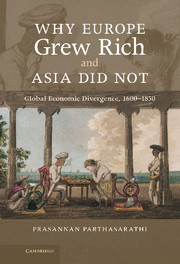Book contents
- Frontmatter
- Contents
- Figures
- Maps
- Tables
- Acknowledgments
- Abbreviations
- Maps
- Chapter 1 Introduction
- Part I Setting the stage: Europe and Asia before divergence
- Part II The divergence of Britain
- Chapter 4 The European response to Indian cottons
- Chapter 5 State and market: Britain, France and the Ottoman Empire
- Chapter 6 From cotton to coal
- Part III The Indian path
- Notes to the text
- Bibliography
- Index
Chapter 6 - From cotton to coal
Published online by Cambridge University Press: 07 September 2011
- Frontmatter
- Contents
- Figures
- Maps
- Tables
- Acknowledgments
- Abbreviations
- Maps
- Chapter 1 Introduction
- Part I Setting the stage: Europe and Asia before divergence
- Part II The divergence of Britain
- Chapter 4 The European response to Indian cottons
- Chapter 5 State and market: Britain, France and the Ottoman Empire
- Chapter 6 From cotton to coal
- Part III The Indian path
- Notes to the text
- Bibliography
- Index
Summary
Introduction
The breakthroughs in cotton spinning, which were complemented by advances in weaving technology from the early nineteenth century, reversed the longstanding trading relationship between Europe and Asia. The new order was first apparent in overseas markets for Indian cloth, where British goods began to displace Indian. By the early nineteenth century, British cotton masters began to market their imitations of Indian goods, often giving them Indian names, in the Americas, West Africa and the eastern Mediterranean and began to supplant Indian products. From the 1820s, British machine-spun yarn began to be exported to the subcontinent itself, commencing the deindustrialization of nineteenth-century India. And from mid-century, the cotton cloth of Lancashire began to be exported in enormous quantities to the Indian subcontinent – the birthplace of cotton.
- Type
- Chapter
- Information
- Why Europe Grew Rich and Asia Did NotGlobal Economic Divergence, 1600–1850, pp. 151 - 182Publisher: Cambridge University PressPrint publication year: 2011



